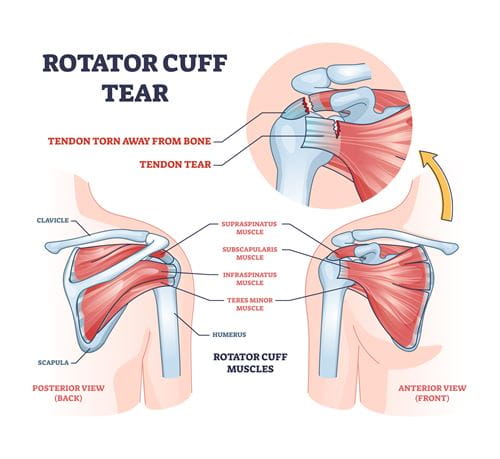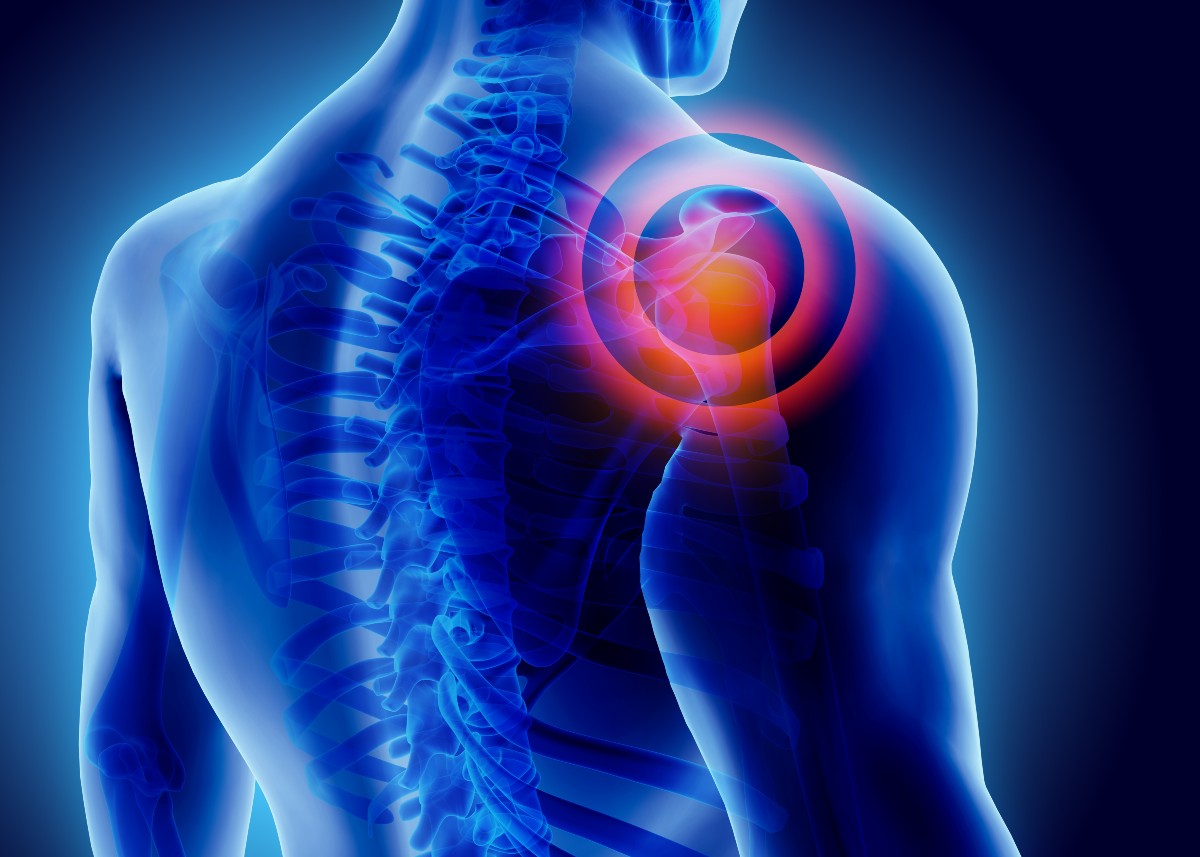If you’ve been living with a dull, persistent ache deep in your shoulder, especially one that worsens at night or interferes with sleep, you may be dealing with a torn rotator cuff. When symptoms begin to affect daily life or limit arm movement, it's time to consult an orthopedic specialist.
What Is the Rotator Cuff?

The rotator cuff consists of four muscles and tendons that work together to support and stabilize the shoulder joint. These structures stabilize the shoulder and enable a wide range of motion, especially in overhead activities like reaching, lifting or throwing.
“Some rotator cuff tears happen due to a single event, but most of the time, the rotator cuff becomes damaged because of overuse,” explains Paul B. McLendon, M.D., board-certified shoulder surgery specialist with Riverside Orthopedic Specialists. “The tendons get stressed over time and can tear from repetitive use, and the tear can become larger as you move your shoulder.”
People who frequently use overhead arm motions, such as athletes in baseball or tennis, or individuals with physically demanding jobs, are at greater risk for injury.
Signs You May Have a Rotator Cuff Tear

Not all shoulder pain is related to a tear, but specific symptoms may indicate damage to the shoulder muscles or tendons:
- Deep, aching pain in the shoulder
- Discomfort that intensifies when resting on the injured shoulder
- Shoulder weakness or difficulty lifting the arm
- Loss of active range of motion
- Clicking or popping when moving the shoulder
If symptoms persist, your primary care provider may refer you to an orthopedic surgeon for further evaluation.
Diagnosing a Rotator Cuff Injury
Diagnosis typically starts with a physical examination to assess pain, range of motion and strength. Imaging tests like X-rays (to rule out bone issues) and MRI scans (to visualize soft tissues) help determine the extent of the damage.
For some, a partial tear may cause discomfort, while others with complete tendon tears may struggle with basic movements like reaching up or behind the back.
Nonsurgical Treatment Options
Not all rotator cuff tears require surgery. Conservative management may be effective, especially for partial tears or less active patients:
- Physical therapy: Targeted exercises to strengthen surrounding shoulder muscles and restore function
- Nonsteroidal anti-inflammatory drugs (NSAIDs): Medications like ibuprofen to manage pain and inflammation
- Steroid injections: Corticosteroid shots may temporarily reduce inflammation and improve mobility
- Activity modification: Avoiding overhead lifting or repetitive arm movements
“If pain stays the same or worsens with nonsurgical methods – or you use your arm for overhead work or sports – surgery may be the best option,” Dr. McLendon says.
When Is Surgery Recommended?
Rotator cuff surgery may be appropriate if:
- The tear is large or complete
- Symptoms persist despite months of nonsurgical treatment
- You need to regain full strength and function for sports, work or daily life
Arthroscopic Rotator Cuff Repair
This is the most common surgical technique and is considered minimally invasive. A small camera (arthroscope) is inserted through a tiny incision to view the shoulder joint. Surgical instruments are then used to reattach the torn tendon to the bone.
Advantages of arthroscopic shoulder surgery include:
- Smaller incisions
- Less postoperative pain
- Faster recovery compared to open surgery
What to Expect After Surgery
Recovery from rotator cuff repair varies by individual and the severity of the tear. Most patients wear a sling for several weeks, followed by a structured physical therapy program that gradually restores strength and mobility.
Recovery may take 4 to 6 months, though some individuals regain full function sooner.
Preventing Rotator Cuff Injuries
To minimize the risk of injury or reinjury:
- Incorporate shoulder-strengthening exercises into your routine
- Warm up before athletic activity
- Avoid repetitive overhead motions without rest
- Use proper lifting techniques at work and during workouts
When to See a Specialist
If you're experiencing ongoing shoulder pain, limited mobility or weakness that disrupts your lifestyle, don't wait. Early diagnosis and treatment can prevent further damage and help you return to normal activity levels.
Our orthopedic experts specialize in rotator cuff pain, diagnosis and repair, offering advanced treatments like arthroscopic rotator cuff surgery in a comfortable, state-of-the-art setting.
When to See an Orthopedic Specialist
If your shoulder feels unstable, painful or has dislocated more than once, consult an orthopedic surgeon or sports medicine specialist. Early treatment can reduce the risk of chronic pain, arthritis and long-term joint damage.
At Riverside Orthopedic and Sports Medicine Specialists, we offer expert care and the latest techniques in arthroscopic shoulder surgery and rehabilitation. Find a convenient location near you and get back to doing what you love – without pain or limitation.
Schedule an appointment onlineso you can be evaluated right away.
Riverside OrthoConnecthas next business day appointment availability in most cases.
Or call the Riverside Sports Medicine Hotline at 757-534-6767, from 7am-10pm, 7 days a week to schedule an appointment with a sports medicine specialist. Same day/next day availability in most cases.



